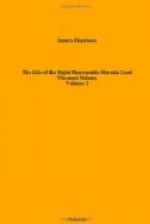Lord Nelson, it may be supposed, had received very full powers from their Sicilian Majesties; with the advice of their equally brave, wise, and skilful privy-counsellor, General Sir John Acton: but, such was the delicacy of his lordship in the exercise of his almost limitless authority, that no single instance can be with truth adduced, where he ever interfered with the criminal jurisprudence of the country; except, indeed, on the side of mercy, to which his excellent heart, it is well known, constantly inclined.
On the 24th, they arrived in the Bay of Naples; where Lord Nelson saw a flag of truce flying on board the Seahorse, Captain Foote, and also on the Castles of Ovo and Nuovo. Having, on the passage, received information, that an infamous armistice was entered into with the rebels of those castles, to which Captain Foote had put his name, his lordship instantly made the signal to annul the truce; being determined, as he said, never to give his approbation to any terms, with rebels, but unconditional submission. The fleet was now anchored in close line of battle, north-west by north, and south-east by south, from the mole head, one mile and a half distant; flanked by twenty-two gun and mortar boats, which he had recalled from Procida.
His lordship sent, instantly, Captains Troubridge and Ball to the Cardinal Vicar-General Ruffo; to represent to his eminence, the opinion which he entertained of the infamous truce entered into with the rebels. They were also charged with two papers to his eminence, expressive of these sentiments; one of which was intended for their perusal, previously to the agreed surrender. The cardinal, however, declared that he would send no papers; and that, if his lordship pleased, he might break the armistice, for he was himself tired of his situation. Captain Troubridge then asked this plain question—“If Lord Nelson breaks the armistice, will your eminence assist him in the attack of the castles?” His answer was decisive—“I will neither assist him with men nor guns.”
After much talking, to very little purpose, his eminence expressed a wish to see his lordship on board, that he might converse with him respecting this situation of affairs; and they, accordingly, accompanied him thither. Sir William Hamilton interpreted between Lord Nelson and Cardinal Ruffo, till he was almost exhausted with fatigue. The dispute lasted about two hours, and frequently ran very high; the cardinal, however, proved more than a match for Sir William and his lordship together in volubility, though far from equal to either in true eloquence. The venerable Sir William, at length, vexed and wearied, calmly seated himself; and requested his lady, though less loquacious than the generality of her sex, to assist their honourable friend, who continued pacing the cabin with the most determined perseverance, in conducting this war of words. The pleasingly persuasive voice of her ladyship, delivering the manly sentiments of




